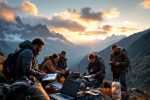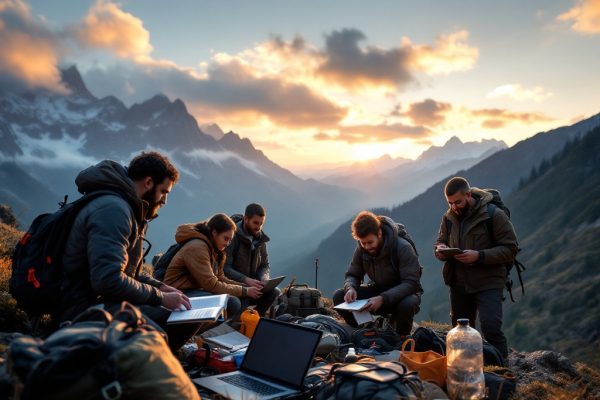How to Take Part in University Research Expeditions Programs
Want invaluable hands-on research experience? University expeditions offer unique opportunities to apply classroom knowledge in real-world settings. Develop crucial skills, expand your professional network, and contribute to groundbreaking discoveries in diverse fields like biology and anthropology. Explore exciting destinations, gain fieldwork experience, and boost your career prospects. Discover the perfect expedition and launch your research journey – start reading now!
Important information

- Research expeditions offer hands-on field experience, skill development (like teamwork and critical thinking), networking, and career advancement.
- Applications usually require a personal statement, CV, and recommendation letters. Meeting deadlines is crucial.
- Funding can come from university grants, government funds, scholarships, or non-profit sponsorships.
- Essential skills include medical training, navigation, and technical expertise relevant to the research area.
- Physical fitness is vital; prepare based on the expedition’s location and activities.
Understanding University Research Expeditions Programs
University research expeditions offer invaluable hands-on field experience, allowing students and researchers to collaborate and advance scientific knowledge. These programs span diverse disciplines, such as environmental science, biology, and anthropology, immersing participants in unique locations worldwide. They gather data, conduct experiments, and directly apply classroom learning to real-world scenarios. Beyond academics, expeditions cultivate teamwork, critical thinking, and essential problem-solving skills, enriching the overall learning journey.
What is a Research Expedition?
Scientific research expeditions are field trips designed to gather data and explore new frontiers, ultimately expanding our understanding of the world. These hands-on experiences offer invaluable real-world learning opportunities, often in remote and unique environments like jungles or glaciers. Such expeditions not only lead to groundbreaking discoveries but also cultivate a deeper appreciation for our planet.
Why Participate in a University Research Expedition?
University research expeditions offer invaluable hands-on experience, allowing students to apply classroom knowledge in real-world settings. These adventures cultivate essential skills, expand professional networks, and foster personal growth. Expeditions often contribute to significant research, encouraging collaboration and critical thinking. Participating can significantly boost career prospects while deepening your field-specific knowledge. Furthermore, these programs offer unique learning opportunities beyond the traditional classroom. Here are some key benefits:
- Hands-on experience: Apply your knowledge in real-world scenarios, gaining practical skills and a deeper understanding of your field.
- Skill development: Cultivate essential skills such as critical thinking, problem-solving, and teamwork.
- Networking opportunities: Expand your professional network by connecting with researchers, professionals, and fellow students.
- Personal growth: Develop independence, adaptability, and cross-cultural communication skills.
- Career advancement: Enhance your resume and boost your career prospects with unique research experience.
- Contribution to research: Participate in meaningful research projects that contribute to scientific discovery and knowledge advancement.
- Unique learning: Experience learning beyond the traditional classroom, enriching your educational journey.
Finding the Right University Research Expedition for You
Finding the ideal university research expedition involves matching your interests with your academic goals. Expeditions differ in research focus, location, and length.
Start by checking your university’s research office or relevant academic departments for opportunities.
Explore university websites and newsletters dedicated to expedition listings.
Broaden your search online by exploring universities known for field research.
Attend academic conferences for networking and information on upcoming expeditions.
Utilize social media and academic forums for additional leads.
When evaluating expeditions, consider the following:
- Research area, does it align with your interests?
- Location, is it feasible and desirable?
- Time commitment, can you dedicate the necessary time?
Assess the required skills and training:
- Medical certifications.
- Navigation skills.
- Technical expertise.
Fieldwork can be physically demanding, so evaluate the requirements and ensure you are prepared.
Expedition Opportunities and Destinations
University research expeditions take researchers to various locations connected to their fields of study. Marine biologists explore coral reefs, anthropologists study remote villages, and geologists survey mountainous regions. The specializations of universities and research organizations influence expedition destinations. A university known for oceanography might explore the coasts and deep sea, while a university with a strong archaeology program might lead expeditions to historical sites or paleontological areas. These specialized expeditions allow for in-depth research.
Open Calls for Expedition Participation and Applications
Finding the right research expedition requires a proactive approach. Explore university websites, departmental bulletin boards, and specialized research platforms. Connect with faculty, subscribe to newsletters, and attend department meetings to stay informed. Online academic journals and university research sites are also valuable resources for finding calls for expeditions.
Before You Apply
Ensure you meet the program’s specific requirements. Check for GPA cutoffs, required coursework, and any prior research experience.
- application form,
- statement of purpose,
- letters of recommendation, and
- transcripts.
Application Process
Gather all necessary application materials.
Deadlines vary. Carefully review each program’s details for accurate deadline information.
Applying to University Research Expeditions Programs
Embarking on a university research expedition starts with exploring programs aligned with your interests. A complete application typically includes personal statements, a CV, and recommendation letters. Some programs may incorporate interviews or request additional documents. Meeting deadlines is crucial. Highlighting relevant coursework and prior research experience strengthens your application. For program-specific requirements, consult the program website or contact the university’s research department. Exploring online academic networks can also unveil upcoming expedition opportunities.
Explore Programs: Begin by researching programs that align with your academic interests.
Prepare Application Materials: A complete application typically includes personal statements, a CV, and recommendation letters.
Check for Additional Requirements: Some programs may require interviews or supplemental documents.
Meet Deadlines: Submitting your application by the deadline is essential.
Highlight Relevant Experience: Emphasize relevant coursework, research experience, and skills in your application materials.
Consult Program Resources: Refer to the program website or contact the university’s research department for program-specific requirements.
Explore Online Networks: Use online academic networks to discover upcoming expedition opportunities.
Understanding the Application and Selection Process
Embark on your university research journey by selecting a program that complements your academic goals. The application process usually involves:
- a personal statement,
- a CV, and
- letters of recommendation.
Be ready for a possible interview and additional document requests. Deadlines are critical, so note them carefully. For program details, visit the university’s research department or program website. A strong statement of purpose and compelling recommendation letters are key. Highlighting relevant coursework and previous research experience strengthens your application. While interviews aren’t always required, preparing for one is recommended.
Writing an Effective College Essay for Expedition Applications
Crafting a compelling college essay is paramount for a successful expedition application. It’s your opportunity to highlight your unique skills, experiences, and genuine passion for the expedition’s objectives. Clearly articulate why this particular expedition resonates with you and how it aligns with your academic and career aspirations. Demonstrate your understanding of the research area and the expedition’s overall purpose. Highlight relevant skills such as language proficiency, fieldwork experience, or adaptability. Explain how these assets will benefit the team and contribute to the research effort. Reiterate your enthusiasm and commitment to the expedition in the closing. A well-written essay can significantly improve your chances of selection.
Explain your motivations. Clearly articulate why this specific expedition resonates with you and how it aligns with your academic and career aspirations.
Show your understanding. Demonstrate your comprehension of the research area and the expedition’s overall purpose.
Highlight your skills. Emphasize relevant skills such as language proficiency, fieldwork experience, or adaptability.
Explain your contribution. Detail how your skills and experiences will benefit the team and contribute to the research effort.
Reiterate your commitment. Close by reiterating your enthusiasm and commitment to the expedition.
Grant Applications and Funding Opportunities
Funding your university research expedition might seem daunting, but numerous avenues exist. Explore university grants, government research funds, and scholarships. Non-profits sometimes offer sponsorships, and financial aid programs can assist those with demonstrated need. Consider these funding sources:
- University grants, often available through internal research initiatives.
- Government research funds, allocated for specific fields of study.
- Scholarships, awarded based on academic merit or research potential.
- Non-profit sponsorships, sometimes offered by organizations aligned with your research area.
- Financial aid programs, designed for students facing financial constraints.
Remember to inquire about funding opportunities when applying and consider all available resources.
Developing Skills for Research Expeditions
Medical training is vital for handling emergencies in remote areas. Wilderness first aid ensures participant safety and facilitates exploration.
Navigation and orienteering skills are equally important, enabling safe travel with maps, compasses, and GPS. These skills are crucial for successful research expeditions.
Map reading and compass proficiency, combined with wilderness first aid, ensures participant safety and facilitates exploration.
Scientific degrees and technical expertise in fields like biology, geology, and data analysis enhance the research value of any expedition.
Essential Skillsets: Medical Training, Navigation, and Orienteering
Medical training is crucial for the health and safety of any expedition. Proper medical training ensures the team can handle illnesses and injuries effectively in remote environments.
Navigation skills, such as map reading and compass use, are essential for guiding teams through unfamiliar terrain. Orienteering, using natural landmarks for navigation, provides an additional safety net, especially in challenging situations. These combined skills are fundamental to the success and safety of research expeditions.
Scientific Degrees and Technical Skills
A strong scientific background in fields like biology, geology, ecology, and environmental science is crucial. Technical proficiency in areas such as data analysis, Geographic Information System (GIS), coding, and equipment operation is also highly advantageous. These skills empower participants to contribute significantly to data collection, analysis, and interpretation throughout the expedition, ultimately enhancing the research impact and overall outcomes.
Roles and Responsibilities in Research Expeditions
The leader oversees logistics, prioritizing safety and team coordination.
The medic provides healthcare and manages emergencies.
The scientist designs and conducts the research.
Each role is essential, requiring specialized skills and training to ensure expedition success.
Critical Expedition Roles: Leader, Medic, Scientist/Researcher
The expedition leader oversees all logistical aspects and prioritizes the team’s safety.
The medic delivers essential healthcare and manages any emergencies, ensuring everyone’s well-being.
The scientist develops and carries out the research, collecting and analyzing the resulting data.
Training and Preparation for Expedition Roles
An expedition’s success relies heavily on the specialized training of each team member.
- Leaders, for example, undergo intensive preparation in decision-making and risk management.
- Medics receive crucial training in wilderness medicine, encompassing emergency care and evacuation procedures.
- Scientists refine their data collection, analysis, and research methodologies.
While prior fieldwork experience can be beneficial, core skills are essential for all expedition members.
- Teamwork.
- Problem-solving.
- Adaptability.
- Communication.
Effective communication fosters safety and coordination, while adaptability proves invaluable when facing unforeseen challenges in demanding environments.
Preparing for Your Research Expedition
Research expeditions demand varying levels of physical fitness based on location and activities. Hiking expeditions require endurance and strength, while desert expeditions require heat tolerance. High-altitude trips necessitate acclimatization and an understanding of altitude sickness. Before any strenuous activity, consult a healthcare professional for a medical evaluation.
Packing the right gear is crucial. Essential items include climate-appropriate clothing (such as waterproof and insulating layers), navigation tools (like GPS devices, maps, and compasses), and safety equipment (including a first-aid kit, emergency communication device, and appropriate footwear). Remember to pack any specialized research equipment needed for your expedition’s objectives.
Physical Fitness Requirements
Research expeditions demand robust physical fitness. These challenging journeys push participants to their limits, making thorough preparation essential. A well-structured training program is crucial, focusing on building endurance, strength, and adaptability. Prioritizing physical conditioning ensures participants can meet the expedition’s rigorous demands and contribute effectively to research objectives.
Expedition Packing List and Equipment
Pack smart for a successful trip. Bring clothes suitable for the weather and comfortable, durable shoes. For navigation, pack a map, compass, or GPS device. A first-aid kit is essential for minor injuries.Depending on your research, you may need specialized equipment like cameras, sampling kits, or scientific instruments. Don’t forget essential personal items: toiletries, sunscreen, insect repellent, and a headlamp or flashlight.
Step 1: Pack weather-appropriate clothing. Choose outfits suitable for the expected climate conditions during your trip.
Step 2: Select comfortable and durable footwear. Ensure your shoes can withstand the terrain and activities planned for your research.
Step 3: Pack navigation tools. Bring a map, compass, or GPS device to help you stay oriented and find your way.
Step 4: Prepare a first-aid kit. Include essential supplies to address minor injuries or ailments that may occur during your trip.
Step 5: Gather specialized research equipment. Pack any necessary cameras, sampling kits, scientific instruments, or other tools relevant to your research objectives.
Step 6: Remember essential personal items. Don’t forget toiletries, sunscreen, insect repellent, and a headlamp or flashlight to ensure your comfort and safety.













